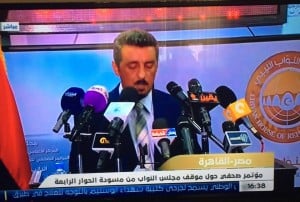
The official spokesperson of the HoR explained the reasons why it had rejected Leon’s fourth draft agreement at a press conference in Cairo (Photo: Social media).
Faraj Abuhashim the official spokesperson for Libya’s only internationally recognized parliament, the House of Representatives (HoR), explained in more detail the reasons why the HoR was rejecting Bernardino Leon’s fourth draft peace agreement.
The UN-led dialogue process had presented the two main conflicting Libyan parties with a fourth draft at Skhirat, Morocco as a compromise solution to end Libya’s current political split.
The main pillars of the HoR’s rejection were based on the principles of democracy, legitimacy the social contract and rejection of use of force, Abuhashim revealed.
”The HoR had won free and fair elections and a group used force to reject it’’, Abuhashim opened at the Wednesday night press conference held in Cairo.
”The HoR chose dialogue as a strategic option for peace and made concessions by agreeing to a unity government even though it went against the Transitional Constitutional Declaration (TCD)’’.
The TCD is the current temporary constitution or social contract and political roadmap governing the dynamics between the Libyan public and their rulers and was announced by the National Transitional Council (NTC) in the middle (August) of the 2011 revolution.
”The fourth draft was a surprise and a coup on democracy and the TCD. It re-legitimized the GNC’’, Abuhashim complained.
The term of the General National Council (GNC) had been ended by virtue of the 2014 HoR elections. The GNC were the body that had set up the 2014 HoR elections.
”The HoR rejects the legitimization of militias and the division of sovereign powers as well as the setting up of a parallel legislative body’’, he explained further.
His mention of militias was a reference to the invasion of Tripoli by pro GNC militias in July 2014 forcing the newly elected HoR to flee into exile to the eastern city of Tobruk.
With regards to the division of sovereign powers, Abuhashim was referring to what he deemed a reduction in the powers of the HoR as proposed in the third draft, while 90 members of the rump General National Congress would be made members of significantly empowered 120 member State Council. He felt that there were too many core changes in the fourth draft.
Nevertheless, he did not rule out further dialogue, adding that the HoR was for dialogue and for the third draft and for the setting up of a new consultative body in which the opposition would be granted seats.
However, analysing what the official HoR spokesperson had said, it seems that the HoR felt that what had started off as a consultative body in the third draft had become a parallel legislative body in the fourth draft
The official HoR spokesperson said that forming another parallel legislative body would not solve the root political problem in Libya, but would only lead to more problems.
Regarding the HoR’s negotiating team ignoring the HoR’s instructions not to travel to Berlin and return home, Abuhashim denied tensions or splits within the Tobruk-based legislative body, saying that they had not received the instructions until after they had departed Morocco.
On the international community, Abuhashim said that it had ‘’abandoned its responsibility towards Libya after helping depose of Qaddafi and supported an illegitimate party. They abandoned Libya and abandoned democratic principles.’’
Asked by the media that despite defining the opposition as illegitimate and terrorists, the HoR nevertheless sat down to negotiate with the opposition, Abuhashim said that to negotiate with your opponent you had to sit with them, but necessarily recognize them.
By Libya Herald reporter.
http://www.libyaherald.com/2015/06/12/hors-rejection-of-leons-fourth-draft-agreement-based-on-points-of-democracy-and-legitimacy/#ixzz3d1dBezfh

